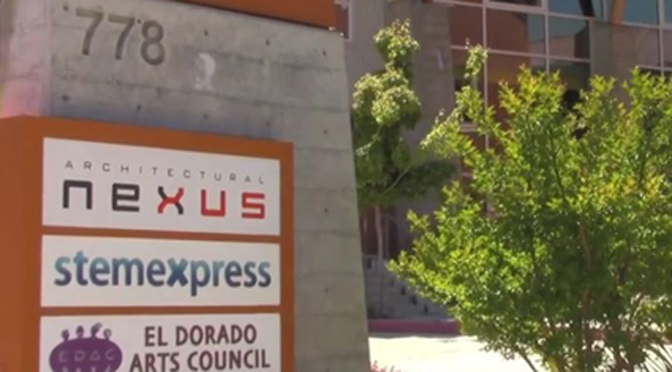Oh, was she ever mad.
She was one of the staff members who works at the El Dorado Art Council, located next to StemExpress. They share a driveway flanked by our protest signs. She had had enough of protesters on the sidewalk. She tore into us as she walked up and down the picket line, snapping pictures of each person. We were ‘ignorant fools’ who were harming not only StemExpress, but also the Arts Council, according to her.
“People have stopped coming. They don’t want to cross the picket line. Veterans especially have stopped coming. How can you stand between people who need help and the organizations trying to help them?” She waved her hand dismissively and yelled, “Go protest somewhere else. This isn’t an abortion clinic!”
We tried to apologize. We certainly don’t want to hamper anyone from participating in the Arts Council programs she provides, but the unethical work of StemExpress is harming us all.
Glaring, she kept snapping pictures.
We tried to explain. “We know they don’t do abortions. But as long as they are desecrating babies, we have to protest these atrocities.”
With those words, she came unglued. “I donated my miscarriage and placenta to StemExpress. How could you say such a thing?”
I tried to respond. “That’s an entirely different circumstance….”
But she refused to listen. Stomping back to her office, she fired her parting shot over her shoulder. “I know who you are. You’re from the Westboro Baptist Church.”
Ouch! So, that didn’t so go well.
Nevertheless, she brings up an important question: Is there a difference between a mother who offers up her child who died of natural causes for the good of medical research, and one who signs the consent form from which StemExpress is making its millions on harvesting aborted fetal body parts?
In other words, should it matter to researchers and the beneficiaries of potential medical cures how research specimens are obtained?
As human beings, we understand that the sources from which our needs are met are as important as the need itself. Both humans and lions experience hunger, but the lion never stops and asks if it is ethical to kill and eat the zebra. He chases and chomps in a state of amoral bliss. But his lack of moral inquiry is one of the distinguishing characteristics between what is animal and what is human.
As human beings, we want to know where our food and even our coffee comes from. Only humans care about whether the pickers of our coffee beans were paid fairly or whether rain forests were destroyed to plant the coffee bushes.
In our world, we acutely feel the need for medical cures. Sickness, suffering, and death destroy human lives. Efforts to mitigate suffering, find cures, and forestall death are good works. But if it matters how we treat the humans who grow our food, then it matters how we treat the humans we use in our research, too.
For a mother to sign parental consent to donate a wanted child who died of natural causes to research is a much different source than the consent given by a mother who aborts her baby.
Parents proven guilty of abandonment and other wrongs lose their parental rights to the State who then must make decisions in the best interest of the child. But because it’s perfectly legal to choose not to mother a child still in utero, the aborted person lacks all protection. Without protection of State or parent, parting out a baby abandoned from the womb has become legal too.
But these parental consent forms – the ones allowing the parting out of aborted babies – serve another purpose, too. They allow the State to wash its hands of the killing and desecration of ‘unwanted’ children, even as it grandly funds enormous research which creates a market for throwaway children.
In sleepy Placerville, California, StemExpress stakes the legitimacy of its work on three premises: the potential good of medical cures justifies all, aborted children have been degraded to “waste,” and the signed consent of the mother allows it. None of these bear the weight of ethical scrutiny.
As the angry neighbor of StemExpress proves, there are ethical means for obtaining human specimens. But an aborted baby wrapped in a consent form is not one of them. We are a culture who cares about fair trade, even as we deny the protection of a whole group of human beings separated from us, not by an equator, but by a uterine wall.
Such hypocrisy and inhumanity degrades us all.
Author’s Note: If you feel called to protest against StemExpress, join us on the sidewalk outside StemExpress any Monday, Wednesday, or Friday from 12 -1 pm. Please keep us in your prayers that we would know how to love our neighbors even as we stand for the truth. For questions, contact Marcia.







